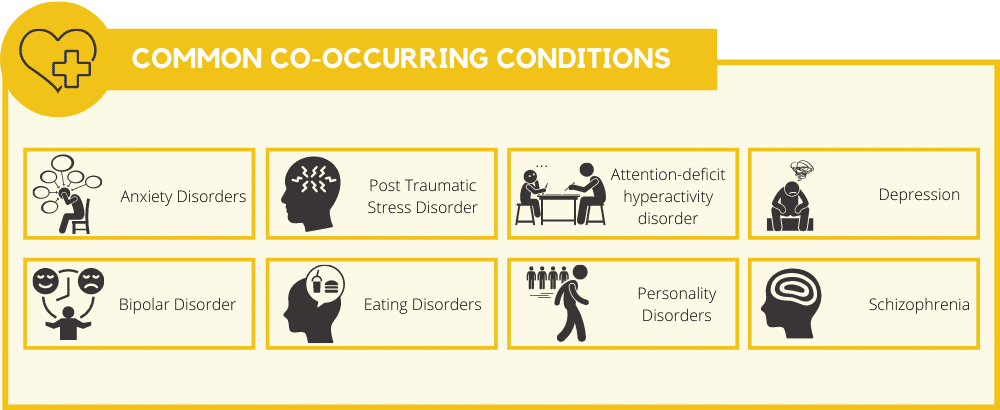Dual diagnosis rehab provides integrated treatment to people who struggle with co-occurring substance use disorders and mental health issues. Although it is possible for addiction to develop on its own, it is estimated that up to 50% of people with substance use disorder also struggle with mental illness at some point in their lives and vise versa.[1]
Unfortunately, co-occurring disorders can make treatment and recovery complicated. People who struggle with mental health conditions need specialized care to address these underlying conditions if they want to have success in sobriety. On the other hand, it’s unlikely a mental health condition will improve if a person is abusing or hooked on drugs and/or alcohol. Instead, recovery requires treating both conditions. Both mental illness and addiction can exacerbate the other, but recovery from one promotes recovery from both.
It is vital to accurately diagnose co-occurring disorders and provide individualized care consisting of behavioral therapy, peer support, and medication (when necessary). Dual diagnosis treatment centers in West Palm Beach can provide care for these individuals.
Who Needs Dual Diagnosis Rehab?
It is often difficult to determine which came first–the mental health condition or the addiction. However, due to the high comorbidity between mental illness and substance abuse, even people who are not formally diagnosed with a mental health issue may receive dual diagnosis treatment. Signs that a person can benefit from dual diagnosis rehab in West Palm Beach include:
- Using substances to cope with symptoms of depression or anxiety
- Isolating from loved ones and using substances alone
- Feeling as though one cannot be happy or content without substances
- Having a past history of trauma, abuse, or neglect
- Having a family history of mental illness
When patients first enroll in a treatment program, they go through a pre-screening procedure. In most cases, this allows the treatment facility to decide whether or not dual diagnosis care is required. Also, upon arrival in rehab, patients go through a more comprehensive physical and psychological assessment. A mental health professional may be able to recommend dual diagnosis treatment.
Common Co-Occurring Conditions
There are a number of different mental and behavioral health conditions that often co-occur with drug and alcohol addiction. Some of these include:[1]

- Anxiety disorders (generalized anxiety disorder, obsessive-compulsive disorder, and phobias)
- Post-traumatic stress disorder (PTSD)
- Attention-deficit hyperactivity disorder (ADHD)
- Depression
- Bipolar disorder
- Eating disorders (anorexia nervosa, bulimia, binge eating disorder)
- Personality disorders (antisocial personality disorder, borderline personality disorder, avoidant personality disorder, etc.)
- Schizophrenia
What Happens in Dual Diagnosis Treatment?
Dual diagnosis rehab programs in West Palm Beach begin with detox. Detox involves clearing the body of drugs, alcohol, and other toxins that can stand in the way of the recovery process. Detox is usually managed with medications and around-the-clock monitoring. Once patients are medically stable, they proceed with the rest of the treatment process. Dual diagnosis treatment may look something like this:
- Inpatient rehab – People with co-occurring disorders are best suited for residential care. Patients learn to cope without relying on drugs and alcohol while living in a structured and supportive setting. Inpatient rehab may last 30, 60, or 90 days.
- Partial hospitalization programming (PHP) – During PHP, patients are able to live in their own homes or in sober living as they begin making the transition out of inpatient care and back into the real world. PHP may last a couple of weeks.
- Intensive outpatient programming (IOP) – Patients attend several hours of therapy, 3-5 days each week. They begin learning and implementing relapse prevention strategies in their daily lives.
- Outpatient therapy – Outpatient is the lowest level of care where patients only attend 3-5 hours of therapy each week. They are held accountable in their recovery and have regular check-ins with their therapist.
- Aftercare – Aftercare may consist of ongoing mental health counseling, 12-Step meetings, alumni programs, and/or sober living.
Three of the most important aspects of dual diagnosis care are behavioral therapy, peer support, and medication management. Many mental health conditions can be treated with daily medication. Doctors can help patients find which medication is right for them. While medications get mental health symptoms under control, patients participate in individualized therapy to understand their condition and learn healthier ways to cope–without drugs and alcohol.[2] Lastly, peer support can help hold individuals accountable in their recovery and show them they are not alone in their difficulties.
Find Dual Diagnosis Rehab in West Palm Beach Today
People who struggle with a co-occurring mental disorder and addiction problem have special treatment needs if they are to fully recover. Here at Daylight Recovery Center, our expert mental health therapists work closely with dual-diagnosis patients to help them get to the root of their issues. Combining quality medical and psychiatric care with a relaxing setting is what gives our patients the foundation they need for sobriety.
If you or someone you know is in search of dual diagnosis rehab in West Palm Beach, we can help. Call now.
References:



